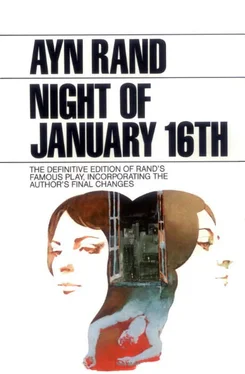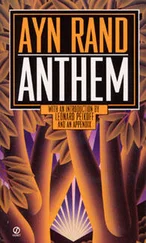Ayn Rand - Night of January 16th
Здесь есть возможность читать онлайн «Ayn Rand - Night of January 16th» весь текст электронной книги совершенно бесплатно (целиком полную версию без сокращений). В некоторых случаях можно слушать аудио, скачать через торрент в формате fb2 и присутствует краткое содержание. Жанр: Драматургия, на английском языке. Описание произведения, (предисловие) а так же отзывы посетителей доступны на портале библиотеки ЛибКат.
- Название:Night of January 16th
- Автор:
- Жанр:
- Год:неизвестен
- ISBN:нет данных
- Рейтинг книги:3 / 5. Голосов: 1
-
Избранное:Добавить в избранное
- Отзывы:
-
Ваша оценка:
- 60
- 1
- 2
- 3
- 4
- 5
Night of January 16th: краткое содержание, описание и аннотация
Предлагаем к чтению аннотацию, описание, краткое содержание или предисловие (зависит от того, что написал сам автор книги «Night of January 16th»). Если вы не нашли необходимую информацию о книге — напишите в комментариях, мы постараемся отыскать её.
Night of January 16th — читать онлайн бесплатно полную книгу (весь текст) целиком
Ниже представлен текст книги, разбитый по страницам. Система сохранения места последней прочитанной страницы, позволяет с удобством читать онлайн бесплатно книгу «Night of January 16th», без необходимости каждый раз заново искать на чём Вы остановились. Поставьте закладку, и сможете в любой момент перейти на страницу, на которой закончили чтение.
Интервал:
Закладка:
Ayn Rand
Night of January 16th
Introduction
If I were to classify Night of January 16th in conventional literary terms, I would say that it represents, not Romantic Realism, but Romantic Symbolism. For those acquainted with Objectivist aesthetics, I can name a more precise classification: Night of January 16th is not a philosophical, but a sense-of-life play.
A sense of life is a preconceptual equivalent of metaphysics, an emotional, subconsciously integrated appraisal of man's relationship to existence. I emphasize this last because it is a man's attitude toward life that constitutes the core and motor of his subconscious philosophy. Every work of fiction (and wider: every work of art) is the product and expression of its author's sense of life. But it may express that sense of life translated into conceptual, i.e., philosophical, terms, or it may express only an abstract emotional sum. Night of January 16th is a pure, untranslated abstraction.
This means that its events are not to be taken literally ; they dramatize certain fundamental psychological characteristics, deliberately isolated and emphasized in order to convey a single abstraction: the characters' attitude toward life. The events serve to feature the motives of the characters' actions, regardless of the particular forms of action -- i.e., the motives, not their specific concretization. The events feature the confrontation of two extremes, two opposite ways of facing existence: passionate self-assertiveness, self-confidence, ambition, audacity, independence -- versus conventionality, servility, envy, hatred, power-lust. I do not think, nor did I think it when I wrote this play, that a swindler is a heroic character or that a respectable banker is a villain. But for the purpose of dramatizing the conflict of independence versus conformity, a criminal -- a social outcast -- can be an eloquent symbol. This, incidentally, is the reason of the profound appeal of the "noble crook" in fiction. He is the symbol of the rebel as such, regardless of the kind of society he rebels against, the symbol -- for most people -- of their vague, undefined, unrealized groping toward a concept, or a shadowy image, of man's self-esteem.
That a career of crime is not, in fact, the way to implement one's self-esteem, is irrelevant in sense-of-life terms. A sense of life is concerned primarily with consciousness, not with existence -- or rather: with the way a man's consciousness faces existence. It is concerned with a basic frame of mind, not with rules of conduct.
If this play's sense of life were to be verbalized, it would say, in effect: "Your life, your achievement, your happiness, your person are of paramount importance. Live up to your highest vision of yourself no matter what the circumstances you might encounter. An exalted view of self-esteem is a man's most admirable quality." How one is to live up to this vision -- how this frame of mind is to be implemented in action and in reality -- is a question that a sense of life cannot answer: that is the task of philosophy.*
* For a fuller discussion of the nature and functions of a sense of life, I refer you to my articles, "Philosophy and Sense of Life" and "Art and Sense of Life," in the February and March 1966 issues of The Objectivist.
Night of January 16this not a philosophical treatise on morality: that basic frame of mind (and its opposite) is all that I wanted to convey.
This play was written in 1933. It started in my mind with the idea of writing a courtroom drama, a murder trial, in which the jury would be drawn from the audience and would vote on the verdict. Obviously, the factual evidence of the defendant's guilt or innocence had to be evenly balanced in order to make either verdict possible. But a jury's disagreement about inconclusive facts could not be of any possible interest or significance. The issue at stake, therefore, had to be psychological.
The springboard for the story was the collapse of Ivar Kreuger -- or, more precisely, the public reaction to that collapse.
On March 12, 1932, Ivar Kreuger, the Swedish "Match King," committed suicide. His death was followed by the crash of the vast financial empire he had created, and by the revelation that that empire was a gigantic fraud. He had been a mysterious figure, a "lone wolf," celebrated as a man of genius, of unswerving determination and spectacular audacity. His fall was like an explosion that threw up a storm of dust and muck -- a storm of peculiarly virulent denunciations.
It was not his shady methods, his ruthlessness, his dishonesty that were being denounced, but his ambition. His ability, his self-confidence, the glamorous aura of his life and name were featured, exaggerated, overstressed, to serve as fodder for the hordes of envious mediocrities rejoicing at his downfall. It was a spree of gloating malice. Its leitmotif was not: "How did he fall?" but: "How did he dare to rise?" Had there been a world press at the time of Icarus and Phaethon, this was the kind of obituary they would have received.
In fact, Ivar Kreuger was a man of unusual ability who had, at first, made a fortune by legitimate means; it was his venture into politics -- mixed-economy politics -- that destroyed him. Seeking a world monopoly for his match industry, he began to give large loans to various European governments in exchange for a monopoly status in their countries -- loans which were not repaid, which he could not collect and which led him to a fantastic juggling of his assets and bookkeeping in order to conceal his losses. In the final analysis, it was not Kreuger who profiteered on the ruin of the investors he had swindled; the profiteers were sundry European governments. (But when governments pursue such policies, it is not called a swindle: it is called "deficit financing.")
At the time of Kreuger's death, it was not the political aspects of his story that interested me, but the nature of those public denunciations. It was not a crook that they were denouncing, but greatness as such; it was greatness as such that I wanted to defend.
This, then, was my assignment in Night of January 16th: to dramatize the sense of life that was vaguely symbolized by Ivar Kreuger, and set it against the sense of life blatantly revealed by his attackers.
Bjorn Faulkner, the hero who never appears in the play, is not Ivar Kreuger; he is what Ivar Kreuger might have been or, perhaps, ought to have been. The two sides in the play are represented, on the one hand, by Bjorn Faulkner and Karen Andre, his secretary-mistress who is on trial for his murder -- and, on the other, by John Graham Whitfield and his daughter. The factual evidence for and against the accused is (approximately) balanced. The issue rests on the credibility of the witnesses. The jury has to choose which side to believe, and this depends on every juror's own sense of life.
Or, at least, so I hoped. I was aware, even then, that most people would not see the issue in such terms, that most people are not that consistent, neither in their conscious convictions, nor in their choice of values, nor even in their sense of life. I was aware that they would probably miss the basic antithesis and would judge on the spur or color or drama of the moment, attaching no further significance to their verdict.
I knew also that a sense-of-life issue was not the best way to implement the idea of a trial by an audience-jury, and that some explicit controversial issue would be better, such as birth control or mercy-killing or "trial marriages." But here I truly had no choice. For the life of me, I could not have invented a story dealing with some narrow issue. My own sense of life demanded a theme involving great figures and crucial fundamentals; I could not arouse myself to any interest in anything less -- then or now.
Читать дальшеИнтервал:
Закладка:
Похожие книги на «Night of January 16th»
Представляем Вашему вниманию похожие книги на «Night of January 16th» списком для выбора. Мы отобрали схожую по названию и смыслу литературу в надежде предоставить читателям больше вариантов отыскать новые, интересные, ещё непрочитанные произведения.
Обсуждение, отзывы о книге «Night of January 16th» и просто собственные мнения читателей. Оставьте ваши комментарии, напишите, что Вы думаете о произведении, его смысле или главных героях. Укажите что конкретно понравилось, а что нет, и почему Вы так считаете.









